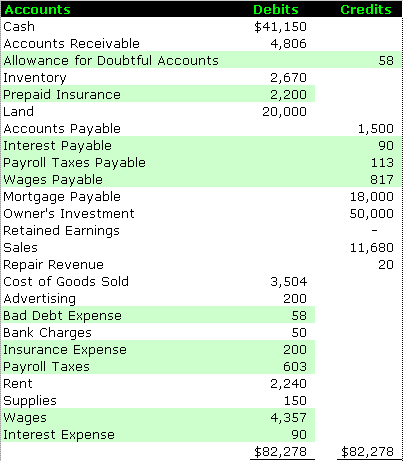Adjusted Trial Balance
| The adjusted trial balance lists the account balances in the general ledger after the adjusting entries are made. |
The adjusted trial balance sheet is used to verify the balance of debits and credits after the adjusting entries are made in the accounting cycle, and to review the balances of each account in preparation of closing entries in the next step in the accounting cycle.
Companies will generally prepare the accounting trial balance on a monthly or quarterly basis, in addition to year-end, in preparation of periodic financial statements.
A sample trial balance appears below for Sunny Sunglasses Shop for January 2010, with each account affected by the adjusting entries highlighted.
Sunny Sunglasses Shop
Adjusted Trial Balance
January 31, 2010
The account balances in the general ledger are each carried over into the adjusted trial balance sheet.
The adjusted trial balance now contains all of the general ledger accounts active after the adjusting entry process.
Two new general ledger accounts were added after estimating the uncollectible amount of accounts receivable: Allowance for doubtful accounts, and bad debt expense. The allowance for doubtful accounts reduces the asset, accounts receivable, by $58. The bad debt expense reduces net income and, consequently, owner’s equity, in January.
Adjusting Entries for Accounts Receivable Reduces Assets and Owners Equity
| Assets | = Liabilities | + Owner’s Equity |
| <$58> | = $0 | + <$58> |
The adjusting entries process added five other new accounts in the adjusted trial balance: interest payable, payroll taxes payable, wages payable, insurance expense, and interest expense.
The other three accounts highlighted, prepaid insurance, payroll taxes, and wages, had additional activity as a result of the adjusting entries.
The debit column lists the total of assets, cost of goods sold, and expenses. The credit column lists the total liabilities, owners equity, and revenue accounts. After the adjusting entries are made, the total debits equal the total credits.
The accounting trial balance contains all of the information that Sunny Sunglasses Shop needs to prepare closing entries and the financial statements for January.
Summary of the Adjusted Trial Balance
The adjusted trial balance worksheet serves two main purposes:
|
Back to the Accounting Cycle and Double Entry Accounting Main Page


please l need help how to prepare and adjusted trial balance dec 31 2009
sales revenue 125,000
salaries expense 6,000
insurance expense 20,000
dividends 290,900
cost of goods sold 12,000
utilities expense 20,350
income tax expense =$793,330 $793,330
Good info.
Thank you for the valuable article. Good explanation of trial balance.
Hi Toloco –
Thank you for the feedback. It is great to know the webiste has helped – even if at the last minute! I have inlcuded a donate button at the top of the page if you would like to donate. Donations help with hosting fees, maintenance fees, in addition to providing new content.
Thank you!
Kenneth
What! I have a test in two hours and u just saved my life. $10 for donation
hey Nicole!
in adjusting trial balance you’ll include those accounts which are going to record as they incur in single year before closing date of that year. e.g. you have recorded expenses and incomes in month of june and you adjust your accounts after each month then all those items you have journalized and posted to ledgers, will be considered for adjustment.
whereas in Post closing trial balance all those items which are incur in whole year will be considered at the end of that accounting period… i hope you get it..
Hi –
Please review these two links for adjusting entries:
Adjusting entries in the accounting cycle
Adjusting entries illustrated
hi!could you show me the adjustments needed to correct the trial balance?
Could you show me how to record Investment. Prepayment and provision for depreciation in Trial Balance. Thanks
Hi Nicole –
All of the account balances in the general ledger are carried over into the adjusted trial balance sheet, including all of the general ledger accounts active or created after the adjusting entry process.
Since all of the income statement accounts are closed in the closing entry process and net income (or loss) is rolled into retained earnings, only balance sheet accounts are shown on the final trial balance.
What accounts are listed in the adjusted trial balance section?
And what accounts are listed on the post closing trial balance section?
Hi Rosanne –
Please see step five in the accounting cycle, which specifically discusses adjusting entries.
Thank you for your comment –
Kenneth
I am taking an online accounting class and looking for helpful tools/tips on how to enter my adjustments correctly into the adjusted trial balance for the debits and credits to balance?
Hi Jeanelle,
Generally supplies can remain in the supplies expense account if they are immaterial to the overall operations of the company. If supplies are more significant in value to the company, then an adjustment can be made by debiting supplies on hand, an asset account, and crediting supplies expense for the amount still on hand at the end of the reporting period (e.g. the year).
how about unused supplies? how do you do adjusted entries then???